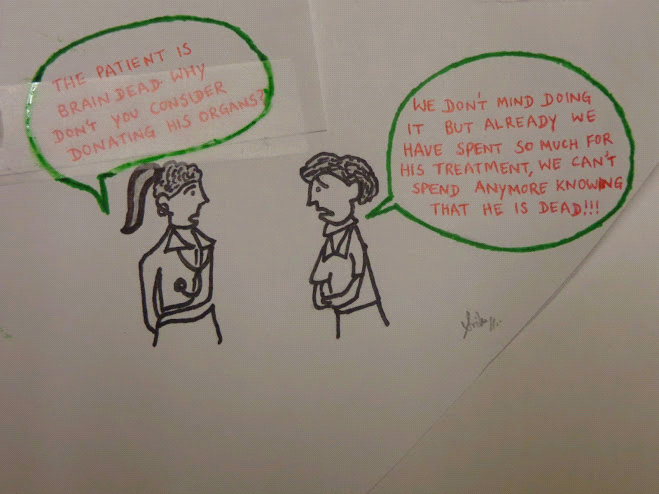|
Some organ transplantation are as follows
1: If I agree to donate my organs, the hospital staff would not work as hard to save my life Fact: When you go to the hospital for treatment, doctors focus on saving your life. The medical team treating you is separate from the transplant team. The team coordinating the donation is not notified until all lifesaving efforts have failed and death has been determined. The transplant team would not be notified until your family has consented for organ donation. 2: Maybe I would not really be dead when they sign my death certificate. Fact: Although it is a popular topic in the tabloids, in reality, people do not start to wiggle their toes after they are declared dead. In fact, people who have agreed to organ donation are given more tests (at no charge to their families) to determine that they are truly dead than are those who haven't agreed to organ donation. 3: Organ donation is against my religion. Fact: Organ donation is consistent with the beliefs of most religions. All organized religions support donation, typically considering it a generous act that is the individual's choice 4: I am under age 18. I am too young to make this decision.
Fact: That is true, in a legal sense.
But your parents can authorize this decision. You can express to your parents your
wish to donate, and your parents can give their consent knowing that it is what
you wanted. Children, too, are in need of organ transplants, and they usually need
organs smaller than those an adult can provide.
Fact: There is no defined cutoff
age for donating organs. Organs have been successfully transplanted from donors
in their 70s and 80s. The decision to use your organs is based on strict medical
criteria, not age. Please do not disqualify yourself prematurely. Let the doctors
decide at your time of death whether your organs and tissues are suitable for transplantation Fact: Very few medical conditions automatically disqualify you from donating organs. The decision to use an organ is based on strict medical criteria. It may turn out that certain organs are not suitable for transplantation, but other organs and tissues may be fine. Please do not disqualify yourself prematurely. Only medical professionals at the time of your death can determine whether your organs are suitable for transplantation.
7: Rich and famous people go to the top of the list when they need a donor organ.
Fact: The rich and famous are not
given priority when it comes to allocating organs. It may seem that way because
of the amount of publicity generated when celebrities receive a transplant, but
they are treated no differently from anyone else. In fact, Jeevandan is the AP State
government programme responsible for maintaining the organ transplant network, online
organ transplant recipients waiting list and make sure the organ allocation was
appropriate. The organ allocation and distribution system is blind to name, celebrity
or social status, or wealth. When you are on the transplant waiting list for a donor
organ, what really counts is the severity of your illness, time spent waiting, blood
type, and other important medical information
Fact: The organ donor's family is
never charged for donating. The family is charged for the cost of all final efforts
to save your life, and those costs are sometimes misinterpreted as costs related
to organ donation. Once death occurs, any expenses related to organ or tissue donation
are covered and there will be no charges to the donor's family.
 
|
